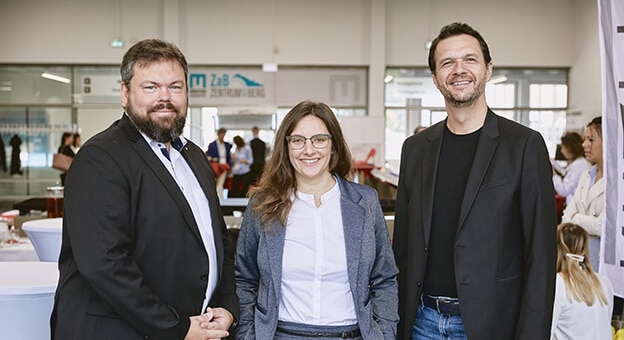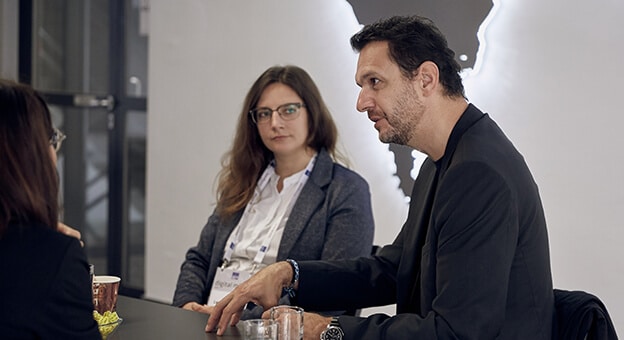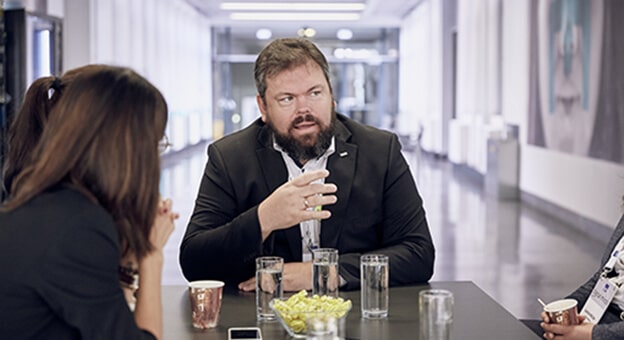We met up with Leonie Müller, Markus Tomaschitz and Christian Becskei at this year’s Leoben Logistics Summer event to discuss the exciting prospect of the working world of the future.
Digitalization and new technologies are opening new possibilities. They are also changing the role of employees within a company. Meaningful tasks that enable individuals to unfold their true potential are what employees are increasingly looking for. We no longer work just to live and we no longer live just to work. The traditional boundary between our private and professional lives is becoming more and more blurred.

What can employees expect from the working world of the future?
Leonie Müller: Many more things will go digital, which will make where and when we work much more flexible. What will remain important, however is human interaction.
What is today’s young generation expecting from employers in the future?
Leonie Müller: It’s not only young people who are looking for opportunities to be flexible and mobile – older generations are too. A sense of purpose and enjoyment at work are things that people of all generations are looking for. We often hear talk that the boundary between our private and professional lives is becoming more blurred, which is negatively impacting our work-life balance, but I have to say that I find this absurd. Humans have both a body and spirit that cannot be separated. Time spent at work is still time we spend living! Ultimately, it is about time spent and used meaningfully.

What challenges will employers have to face as a result?
Markus Tomaschitz: Employers are well advised to listen. It is crucial that the goals of both the employees and the company are achieved – there is no room for any antagonisms. Managers fulfil a vital bridging function here. We will see more and more democratization. This means that some managers will hold temporary leadership terms and some may be elected democratically. It will be crucial that employees are listened to even at an early age. This is a lot to ask of managers because it is much easier to instead choose an authoritative management style. This, however, is well and truly out-dated. Instead, it’s important that we learn to be more trusting.
Do you have any practical tips for managers?
Markus Tomaschitz: My tip is simply to try to place your trust in people and to move away from micro-management. It’s vital to move away from trying to control and regulate everything. The golden rule is: “Don’t do anything that could be damaging to the company.” We at AVL, for example, have tried to get rid of one rule each month.
Christian Becskei: As early as 15 years ago, we already knew that failing to give employees freedom was hugely detrimental to their motivation. It is important to look at an employee as a whole. This means seeing how they are doing on all levels. Companies should ask their employees what they need and what their aims are. All in all, it’s about ensuring their roles are meaningful. Their direct superiors play a crucial role here. Each employee has different needs and their own individual challenges. It’s clear that employees now expect more from companies than was the case in the past. We are witnessing a transformation of the way individuals think – both managers and employees. As a company, it’s important to create the necessary flexibility to address and implement these issues.
How can this be integrated into day-to-day work? Is it also possible for managers who have a different leadership style?
Christian Becskei: Innovations are always accompanied by changes. All of us have to change, including companies. Those people who cling on to things that were all the rage 30 years ago are probably in the wrong position.
Markus Tomaschitz: Leading employees is the most complex task within a company. There are huge expectations and us Europeans are also pretty difficult to manage. There are historical reasons for this anchored in a culture of questioning authority. People want to be led, but in the right way: Managers need to have an answer to everything, be an expert in their field, proactively approach their employees, while both listening to and leading them at the same time. Then there’s also the general burden that they have to carry, which is that employees usually take a critical stance towards their managers. Being a manager is not all positive. Many don’t even want to be one at all.

If managing people is so demanding and many employees turn down the opportunity, are we looking at a move towards self-guiding organizations?
Markus Tomaschitz: We hope that these models work, but at some point decisions need to be made. This is when it’s necessary to fall back to partially authoritarian systems.
Christian Becskei: It is absolutely impossible to achieve anything when things are chaotic. It may not be so extreme in small companies as the employees automatically give them a rough structure. As a company gets bigger, at some point this no longer works. Then it’s important to create a proper structure.
Leonie Müller: Management is still indispensable but we will see it shift towards a role that involves coaching, mentoring and support. Moreover, it will be on equal terms, based on a reciprocal relationship rather than the classic leadership role. Better decisions can be made as a result.
Does the younger generation have a different relationship to leadership?
Markus Tomaschitz: The new generation is extremely confident. They are well educated, have high demands and want to have their say – I have to say that I believe this is fantastic. You really get a sense that they are full of potential – a young generation with significant political awareness. We don’t have to worry about this generation at all. For one thing, they are prepared to make a change when they are no longer satisfied. For another, they serve as a sort of seismograph. It’s easier to detect dissatisfaction as soon as it appears as they articulate it right away. This means that human resources departments have early indicators at their disposal which enable them to respond much faster.
Christian Becskei: The younger generation has learned at a much younger age to provide feedback and also not to hold back any criticism. This is not compatible with authoritarian managers and can foster imbalances within the company. There are two possibilities: either we carry on as we did before or we adapt to the future. The first option is simply preposterous.

How can companies attract the employees of the future to join their teams?
Christian Becskei: The main aim, and I’m including that of companies here, has to be creating something meaningful. They need something that truly attracts people to join. It’s vital that we offer people a vision and share this vision with our employees. If companies manage to do this – to create these well-rounded experiences and to communicate them with authenticity – they will attract new employees like a magnet. In the past, security and financial considerations were more important. In the future, employees will be more visionary and have much more of a voice.
What is your own personal vision of an employer in the industrial sector in 15 to 20 years?
Christian Becskei: We should forget the concept of a “work-life balance”. I was always a fan of “life-balance” as working is an integral part of our lives. Our vision is that of one big family. As employers, we have to think outside the box. It’s vital to really look at the needs of our employees, and how we can help and support them. In other words, we have to move towards a more holistic way of thinking. This means telework, working from home and the like will become usual practice. Employees should work when they are in the best position to. That may not be within the classic core working hours, and that’s OK. I find the idea, for example, of an employee who feels that they need to play tennis with their friend to recharge their batteries and to stay balanced, extremely positive.
Let’s turn to the topic of robotics. In 20 years’ time, will robots have taken on all the strenuous jobs?
Christian Becskei: For generations now, we have been developing these aids to make our lives easier. We are not building robots to replace humans. They will simply make our work easier and relieve us of certain tasks.
Does this mean that they will support us, but the human element will remain central to the world of work?
Markus Tomaschitz: Yes and no. We need humans particularly when it comes to creativity, innovation, care professions and jobs within the social sector. The same applies to areas that involve providing psychological support, such as psychotherapy. The question is, how do we want to work and this is something that every manager has to decide for themselves. Where do we need humans, where do we want to have interaction and where do we need to substitute them with a robot or algorithm. I believe this will be anywhere where machines can take care of strenuous, manual tasks.
Leonie Müller: Humans will always be important. The working world only exists for and with the human workforce. It’s incredibly exciting we are even witnessing an increased demand for creativity in industry. Instead of simply pressing buttons and operating machines, employees can and should incorporate more of their ideas into their work.
Thank you for the inspiring conversation.
Further reading recommendations

Many new opportunities have arisen from digitialization in the logistics context. A look behind the scenes …

Digitization and societal trends are also changing the way we work: how we work, where we work and our role as humans. What will our…

New technologies are changing the workplace of people in logistics and production. Smart workers is what we call this new generation of workers. In the following blogpost, a smart worker takes us on a trip through tomorrow’s world of work.
Additional Information
What’s your opinion on the working world of the future? We look forward to hearing what you think! Feel free to get in touch at blog@knapp.com.
